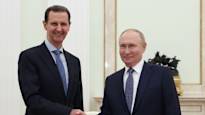The fall of the Syrian leadership does not necessarily increase Putin’s willingness to negotiate in Ukraine, writes Russia correspondent Heikki Heiskanen.
Heikki HeiskanenRussia correspondent
16:43•Updated 17:08
MOSCOW It has been reported that the President of Russia Vladimir Putin watched several times the video recording of the Libyan leader Muammar Gaddafi of death.
After NATO bombings and a rebel ambush stopped Gaddafi’s convoy from escaping, rebels found Gaddafi hiding in a sewer and brutally killed him in October 2011. The incident reportedly left its mark on Putin.
From Putin’s point of view, Gaddafi had made concessions to the West and yet the West overthrew him. The victory of the Libyan rebels was made possible by airstrikes coordinated by the military alliance NATO.
US Secretary of State at the time Hillary Clinton rejoiced at Gaddafi’s death: – We came, we saw, he died.
Putin certainly had that in mind.
In 2015, Russia came militarily Syrian president Bashar al-Assad to help in the bloody civil war. Putin was determined that Assad would not suffer Gaddafi’s fate.
Russia’s large-scale airstrikes and the fighters of Iran and Lebanon’s Hezbollah organization kept the Assad regime afloat.
From Russia’s point of view, it was a geopolitical victory and a kind of point in the series of “color revolutions”.
The color revolutions that overthrew the regimes of the former Soviet Union were a nightmare that the Russian rulers have tried to prevent by all means.
The Russian leadership saw behind them the handprint of the US Central Intelligence Agency, the CIA, and the 2011 Arab Spring turmoil showed part of the same chain.
Most likely, the Russian leadership overestimated the ability of the United States to control chaotic events – just as the United States itself overestimated its own ability to control events in Afghanistan and Iraq.
Now bring Russia as a geopolitical success story the sold victory in Syria has turned into a loss.
With the fall of Assad, Russia is likely to lose its military foothold in the Middle East: the Tartus naval base in Syria and the Hmeimimin air base.
It is very difficult to see that the rebels taking power in Syria would look long at the Russian military presence in Syria. They remember the traces of Russian bombings.
The bases are a bitter loss for the Russian leadership, because over the years Russia has spent a lot of money renovating them.
The loss of Tartus further weakens the operational capability of the Russian Navy in the Mediterranean, as its Black Sea Fleet base is beyond the straits controlled by Turkey.
Russia is also bitterthat the US finally succeeded in slowly eroding the Assad regime.
Under the US sanctions, Assad was no longer able to get the Syrian economy back on its feet. Above all, Assad no longer controlled much of Syria’s oil production.
It is no coincidence that the troops sent by the United States to Syria are sitting right in the country’s central oil production area.
Without that income, it was more difficult for Assad to keep the various factions of his regime, the armed forces and the population in general satisfied.
The Russian leadership’s grip on the situation in Syria tightenedbecause its eyes and armed forces are fixed on the war of aggression in Ukraine.
Unlike in 2015, when its military operations in Ukraine were still limited, Russia had no resources to spare to support Assad.
Russia couldn’t even consider sending ground troops, and probably could only afford air bombardments to a limited extent.
Russia also lost an important pawn in Syria when, in June 2023, the founder of Wagner Yevgeny Prigozhin led the Wagner forces in an ill-fated military revolt in Russia.
After the rebellion, the Russian leadership dissolved Wagner. It probably weakened Russia’s feeling for the situation in Syria, because it was Wagner’s mercenaries who had worked in Syria on the battlefield as Russia’s eyes and ears.
A more important factor than the weakening of Russian support However, behind Assad’s defeat was the fact that Iran and its ally, the Lebanese armed Shiite organization Hezbollah, have been locked in a struggle with Israel and suffered heavy losses.
Sometime in the future, it may become clear what kind of discussions Turkey and Russia, which supported the rebels, have had behind the scenes. Turkey and Russia have maintained contacts, although their interests do not always coincide.
When the choice had to be made between Ukraine and SyriaPutin of course chose Ukraine.
Still, the fall of the allied regime in Syria stings. It probably won’t increase Putin’s willingness to negotiate in Ukraine.
Putin’s attitude may become even tougher, even if the future president of the United States Donald Trump promises that Ukraine is ready for negotiations.
Putin, on the other hand, can console himself with the fact that the situation in Syria is now very unpredictable even for the United States and its allies.
